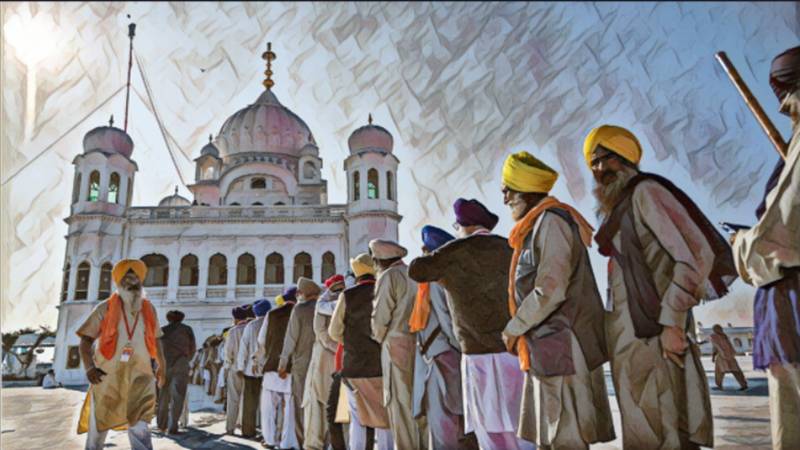
Pakistan, a diverse nation with a rich cultural heritage, is home to various religious communities, including a sizable Sikh community. The country has several historical and religious sites associated with Sikhism, making it one of the favourite pilgrimage destinations for Sikhs, the world's fifth largest religion with about 25–30 million followers. In recent years, Sikhism-related tourism has gained prominence in Pakistan, offering both economic benefits and opportunities to enhance the country's standing on the global stage. Against this backdrop, it is pleasing to note that the caretaker Punjab Chief Minister Mohsin Naqvi is also working on a religious tourism package for intended Sikh pilgrims.
During a recent meeting with a group of Sikhs from the UK and other countries, he assured that the Punjab government was trying to make it easier for Sikh pilgrims to get visas on arrival. "I have talked to the federal government about this, and we hope to have good news soon," he added. The pilgrims also thanked Mr Naqvi for taking care of their religious sites in Lahore, Nankana Sahib, Hassanabdal and Kartarpur.
Sikh tourism in Pakistan holds profound significance on various fronts. It not only showcases the country's commitment to religious tolerance but also serves as a bridge for interfaith harmony. The diverse religious landscape of Pakistan, with its various historical sites, exemplifies the coexistence of different faiths. This demonstrates to the world that Pakistan is a place where people of diverse religious backgrounds can live together harmoniously. It also reflects a commitment to fostering interfaith understanding and cooperation, which is crucial for promoting peace and tolerance in the region.
Religious tourism also provides a platform for cultural exchange and diplomacy. Sikhs from around the world frequently visit Pakistan to perform religious rituals and pay homage to their religious and historical sites. This presents an opportunity for people-to-people diplomacy, fostering goodwill and building stronger international relationships. Visitors experience the warm hospitality of Pakistan, which often dispels misconceptions and stereotypes, leading to a more positive perception of the country. These interactions and connections contribute to diplomacy and can improve Pakistan's relations with other nations, especially India.
Pakistan's efforts to preserve and protect Sikh heritage sites underscore its commitment to preserving cultural and historical assets. This commitment is not only essential for retaining the historical significance of these sites but also for showcasing Pakistan as a guardian of its cultural and religious heritage. Preservation of these sites demonstrates Pakistan's dedication to maintaining its historical tapestry and sharing it with the world. In doing so, it enhances the country's standing as a custodian of heritage and history.
Sikhism-related tourism, particularly through the Kartarpur Corridor, has an added potential to improve relations with neighbouring India. Inaugurated in 2019, the Corridor has opened a door for Sikh pilgrims from India to visit the historically significant Gurdwara Darbar Sahib in the border town of Kartarpur. It also signifies Pakistan's willingness to take steps towards peace and cooperation in the region, thereby strengthening its standing on the world stage.
Also, Sikhism-related religious tourism would contribute to Pakistan's soft power while balancing hegemonic India. Soft power refers to the ability of a country to attract and co-opt rather than coerce; typically through culture, values and policies. Pakistan's diverse cultural and religious landscape, as showcased through Sikhism-related tourism, would present the country as a place of cultural richness and historical significance. This attractiveness can draw international attention, generating interest in visiting Pakistan for religious and cultural exploration, thus boosting the country's soft power. Furthermore, it highlights Pakistan's commitment to religious tolerance, cultural preservation and societal pluralism, while improving the country's standing on the global stage.
Through tourism, Pakistan has an opportunity to share its cultural heritage with the world, foster diplomatic relationships and promote peace and understanding among diverse religious communities. With responsible management and preservation efforts, Sikhism-related tourism has the potential to further elevate Pakistan's image as a nation with a rich cultural history and a welcoming attitude towards visitors from across the globe.
Religious, particularly Sikhism-related tourism, represents a win-win situation; it offers big economic benefits by stimulating tourism-related revenue and job creation. Sikhism-related tourism would also benefit Pakistan's quiescent tourism industry. Pakistan's total exports in Sept 2023 were 2.5 dollars while the Indian tourism sector earned 170 billion dollars in 2021 alone, according to the World Travel and Tourism Council. It may be added that the global faith-based tourism industry has reached a market value of 15 billion dollars in 2023 and Pakistan can fully benefit from it if it develops an adequate infrastructure for the tourists.
The economic benefits derived from tourism extend to various sectors, including hospitality, transportation, and local businesses. Tourism promotes other industries as well; tourists spend money on accommodations, food transportation etc, infusing capital into local economies. This added revenue can help communities flourish, providing job opportunities and encouraging small-scale entrepreneurship. Increasingly essential in today's interconnected global landscape, it brings a myriad of benefits, not only in bolstering a country's economy but also in enhancing its international standing.
It goes without saying that Mr Naqvi has shown himself to be someone who fully understands the importance of economic diplomacy — the practice of leveraging economic and trade relationships to advance a nation's foreign policy objectives. By promoting trade agreements, attracting foreign investments and facilitating access to new markets, Pakistan can experience increased economic prosperity. This, in turn, will lead to higher employment rates and improved living standards for its citizens.

